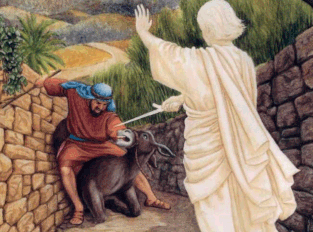BALAAM
a) Balaam, a prophet from Mesopotamia, was willing to use his God-given talents for illicit purposes.
b) Even though he knew king Balak was God’s enemy, he tried to sell his prophetic gifts to help him.
c) When that didn’t work, Balaam counseled Balak on the most effective way to weaken Israel. This was through seduction, using Moabite and Midianite women to tempt the Israelites into sexual relationships and into pagan rituals.
e) The Israelites who participated brought God’s judgment upon themselves (Numbers 25:1–9).
f) Balaam, a diviner who was commanded by king Balak to curse the Israelites. Instead he blessed them and uttered favorable prophecies after having been rebuked by the donkey he rode.
g) What do you call someone who practices divination?
@1. A person who practices divination is called a soothsayer.
@2. A soothsayer predicts the future by magical, intuitive, or more rational means.
@3. He attempts to gain insight into a question or situation by way of an occultic, standardized process or ritual.
@5. He attempts to foretell future events or discover hidden knowledge by occult or supernatural means.
h) Why was Balaam considered a false prophet despite uttering blessings and favourable prophecies?
@1. He gave King Balak insidious advice on how to get the Israelites to commit sin by enticing them with sexual immorality and food sacrificed to idols.
@2. The Israelites fell into transgression due to these traps and God sent a deadly plague to them as a result (Numbers 31:16).
i) What was Balaam's end?
@1. Joshua 13:22 records that Balaam died "by the sword" during a battle for the Reubenite occupation of Moabite land.
j) What is the way of Balaam?
@1. Teaches compromise, wanting Christians to forget they are called to be separate and holy (Leviticus 20:26; 1 Peter 1:2).
@2. Makes believers indistinguishable from the unbelieving world (Matthew 5:13).
@3. Makes a belief that “a little sin” doesn’t hurt (Galatians 5:9), especially if there’s some financial or personal benefit involved (1 Timothy 6:5).
@4. A person following the way of Balaam is willing to compromise his beliefs for the sake of economics. He acts to enable sinful behaviors for personal gain or even participate in them (Romans 1:32).
@5. In practical terms, it is the view that Christians can or even should compromise their convictions for the sake of popularity, money, sexual gratification, or personal gain. It’s the attitude that treats sin as “no big deal.”
@6. According to 2 Peter 2:15, Balaam’s “way” is a choice to promote falsehood for financial reasons.
@7. According to Jude 1:11, Balaam’s “error” was his willingness to accommodate pagan beliefs out of greed.
k) What does the Bible say?
@1. Jude 1:4 also refers to the sin of those “who pervert the grace of our God into a license for immorality.”
@2. One trait of false teachers in the church is that they attempt to turn Christian liberty into a “freedom” to be promiscuous (Romans 14:1–5).

Comments
Post a Comment